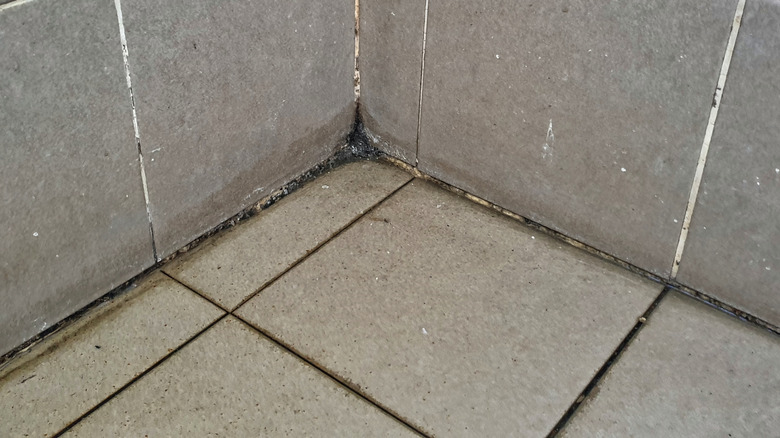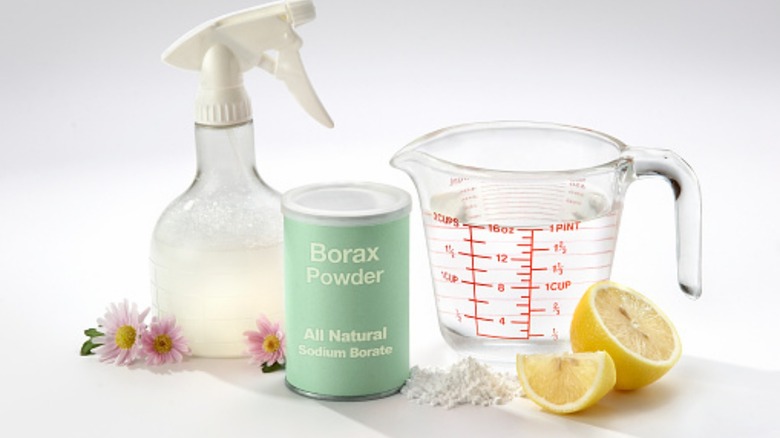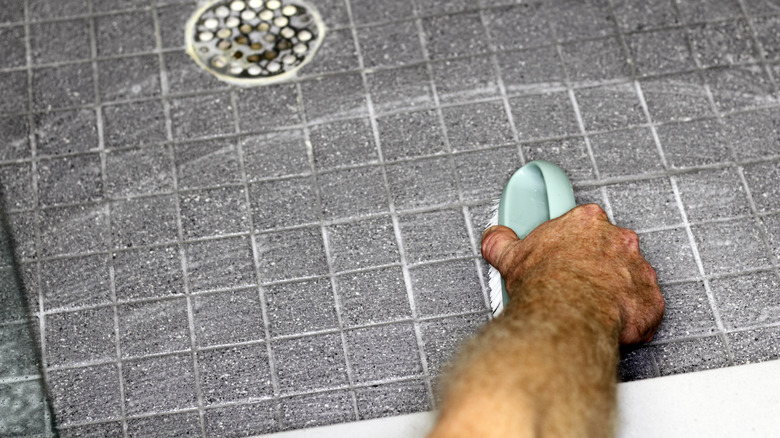Easily Eliminate Grout Stains On Your Floor With An Overlooked Cleaner
Nobody likes cleaning grout lines, but once you notice how dirty they are, it must be done. There are a lot of easy grout-cleaning hacks out there, but it's important to be discerning about which chemicals you use in case they actually corrode it, as some folks found was the case when cleaning grout lines with toilet cleaner. So, instead of relying on the newest trends for our cleaning advice, we decided to look back into the archives for a solid cleaner with tried-and-true results on grout lines, and that's one cleaner called Borax.
Borax, also known as sodium borate, is a naturally occurring mineral used as a household cleaner since Ancient Greece and remained popular throughout the 20th century but fell a bit out of fashion. Borax has a few qualities that make it ideal for grout cleaning: alkalinity, emulsifying powers, and stain-removal capability. Thanks to its alkalinity, with a pH of approximately 9.24, borax can break down oily debris, such as grease and dirt, as well as acidic stains, such as those left behind by food and drink spills. Borax is also invaluable thanks to its ability to remove other minerals like magnesium and calcium, which surely clog your grout lines if you mop with hard water.
How to use borax to clean grout
Now that you know all that borax can offer as a grout cleaner, it's time to get down on the floor and clean. Borax powder won't do much on its own, so you want to mix it with a liquid. Some outlets advise combining borax with cleaning vinegar, and while this is safe, it's counterproductive as the acidic vinegar will weaken the cleaning power of the alkaline borax. Instead, opt for hot water, Castille soap, or baking soda for more cleaning power. You can work the borax and water into a paste, combine the two in a large bucket or bowl for large tile cleaning jobs, or a spray bottle. Either of these solutions will work fine, but remember that adding more water, as in the spray bottle or bucket, dilutes the borax, making it less potent for cleaning. The paste is ideal for heavy-duty cleaning, as it has a higher concentration of borax to water.
You can work the solution of your choice into the grout with a toothbrush, soft-bristle cleaning brush, sponge, or microfiber cloth. These gentle scrubbers can effectively work the product into the grout. We don't recommend using something more abrasive, such as steel wool or a wire brush, as these can physically erode the grout.
Other considerations when using borax
For the most part, borax is a reliable multi-purpose cleaner used in many applications beyond grout, like cleaning drains and toilets, clearing rust, and removing laundry stains. That being said, there are a few things to keep in mind when using it to clean grout lines because grout that isn't properly sealed may be vulnerable to corrosion during cleaning. Whenever you're using a new cleaner on grout, it's key to test a small strip of tile where it isn't easily seen so you have a good idea of how it will work.
According to a 2021 study published in Regulatory Toxicology and Pharmacology, borax is a natural element, not carcinogenic. However, it does come with a few safety guidelines. It can be irritating if it comes in direct contact with the eyes and skin, so be careful when using it and wear gloves and-or goggles if you'll be exposed to it for a long time. Like most cleaners, it can also cause severe issues if inhaled or ingested, so be sure to keep it out of reach of children.


